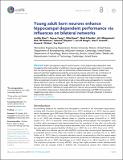| dc.contributor.author | Zhuo, Jia-Min | |
| dc.contributor.author | Tseng, Hua-an | |
| dc.contributor.author | Desai, Mitul | |
| dc.contributor.author | Bucklin, Mark E | |
| dc.contributor.author | Mohammed, Ali I | |
| dc.contributor.author | Robinson, Nick TM | |
| dc.contributor.author | Rangel, Lara M | |
| dc.contributor.author | Jasanoff, Alan P | |
| dc.contributor.author | Gritton, Howard J | |
| dc.contributor.author | Han, Xue | |
| dc.contributor.author | Boyden, Edward | |
| dc.date.accessioned | 2017-04-10T14:07:21Z | |
| dc.date.available | 2017-04-10T14:07:21Z | |
| dc.date.issued | 2016-12 | |
| dc.date.submitted | 2016-10 | |
| dc.identifier.issn | 2050-084X | |
| dc.identifier.uri | http://hdl.handle.net/1721.1/107997 | |
| dc.description.abstract | Adult neurogenesis supports performance in many hippocampal dependent tasks. Considering the small number of adult-born neurons generated at any given time, it is surprising that this sparse population of cells can substantially influence behavior. Recent studies have demonstrated that heightened excitability and plasticity may be critical for the contribution of young adult-born cells for certain tasks. What is not well understood is how these unique biophysical and synaptic properties may translate to networks that support behavioral function. Here we employed a location discrimination task in mice while using optogenetics to transiently silence adult-born neurons at different ages. We discovered that adult-born neurons promote location discrimination during early stages of development but only if they undergo maturation during task acquisition. Silencing of young adult-born neurons also produced changes extending to the contralateral hippocampus, detectable by both electrophysiology and fMRI measurements, suggesting young neurons may modulate location discrimination through influences on bilateral hippocampal networks. | en_US |
| dc.description.sponsorship | United States. National Institutes of Health (1DP2NS082126) | en_US |
| dc.description.sponsorship | National Institute of Mental Health (U.S.) (5R00MH085944) | en_US |
| dc.description.sponsorship | United States. National Institutes of Health (R01-DA028299) | en_US |
| dc.description.sponsorship | United States. Defense Advanced Research Projects Agency (W911NF-10-0059) | en_US |
| dc.description.sponsorship | Pew Charitable Trusts | en_US |
| dc.description.sponsorship | American Federation for Aging Research | en_US |
| dc.description.sponsorship | Alfred P. Sloan Foundation | en_US |
| dc.description.sponsorship | National Institute of Mental Health (U.S.) (1R21MH109941) | en_US |
| dc.language.iso | en_US | |
| dc.publisher | eLife Sciences Publications, Ltd. | en_US |
| dc.relation.isversionof | http://dx.doi.org/10.7554/eLife.22429 | en_US |
| dc.rights | Creative Commons Attribution 4.0 International License | en_US |
| dc.rights.uri | http://creativecommons.org/licenses/by/4.0/ | en_US |
| dc.source | eLife | en_US |
| dc.title | Young adult born neurons enhance hippocampal dependent performance via influences on bilateral networks | en_US |
| dc.type | Article | en_US |
| dc.identifier.citation | Zhuo, Jia-Min, Hua-an Tseng, Mitul Desai, Mark E Bucklin, Ali I Mohammed, Nick TM Robinson, Edward S Boyden, et al. “Young Adult Born Neurons Enhance Hippocampal Dependent Performance via Influences on Bilateral Networks.” eLife 5 (December 3, 2016). © 2016 eLife Sciences Publications Ltd. | en_US |
| dc.contributor.department | Massachusetts Institute of Technology. Media Laboratory | en_US |
| dc.contributor.mitauthor | Boyden, Edward | |
| dc.relation.journal | eLife | en_US |
| dc.eprint.version | Final published version | en_US |
| dc.type.uri | http://purl.org/eprint/type/JournalArticle | en_US |
| eprint.status | http://purl.org/eprint/status/PeerReviewed | en_US |
| dspace.orderedauthors | Zhuo, Jia-Min; Tseng, Hua-an; Desai, Mitul; Bucklin, Mark E; Mohammed, Ali I; Robinson, Nick TM; Boyden, Edward S; Rangel, Lara M; Jasanoff, Alan P; Gritton, Howard J; Han, Xue | en_US |
| dspace.embargo.terms | N | en_US |
| dc.identifier.orcid | https://orcid.org/0000-0002-0419-3351 | |
| mit.license | PUBLISHER_CC | en_US |
| mit.metadata.status | Complete | |
